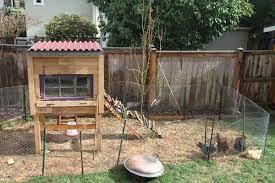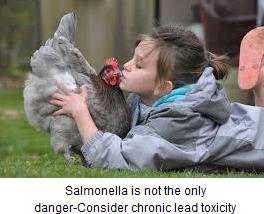A recent publication in the peer-reviewed journal, Environmental Pollution*, confirmed that high levels of lead are present in eggs derived from backyard chickens in the suburbs of major cities in Australia.

Lead is ingested from soil and foliage and accumulates in the blood and organs of hens and is transferred to eggs at potentially toxic levels. Lead in soil is derived from tetraethyl lead (TEL) additives to gasoline through the mid-1980s. Lead concentrations in soil samples from homes in Sydney, Melbourne and Brisbane exceeded what was estimated to be a critical level of 120mg/kg. Above this level, eggs are likely to contain in excess of a 100 micrograms/kg. The suggested upper limit for lead content of soil for residential gardens is 300mg/kg. In Australia lead additives were selectively removed from gasoline during the 1980s but an official ban was enacted in 1996.
Half of 69 chickens sampled in backyard suburban flocks had lead blood levels greater than 20 micrograms/dL considered to be a toxic levels. The authors calculated that consuming an egg each day with a lead level slightly less than 100 micrograms/kg contents would result in blood lead levels that are comparable to children living adjacent to lead mines or smelters.
In contrast, eggs from free-range farms in rural areas contained 7.2 micrograms/kg contents compared to the average lead level in suburban backyard chickens of 301 micrograms/kg. The study also demonstrated a statistically significant correlation between the age of a home and the level of lead in both soil and eggs. This is consistent with long-term deposition of organic lead from vehicle fuel prior to the ban on tetraethyl lead additives.
 The study confirms previous evaluations of toxic levels of lead in eggs from backyard flocks in suburban New York City.
The study confirms previous evaluations of toxic levels of lead in eggs from backyard flocks in suburban New York City.
It is evident that if hens are held in backyards in suburban or urban areas, soil should be assayed to ensure that levels of lead do not compromise the health of consumers and especially, children.
*Yazdanparasta, T. et al. Lead poisoning of backyard chickens: Implications for urban gardening and food production. Environmental Pollution. doi.org/10.1016/j.envpol.2022.119798.